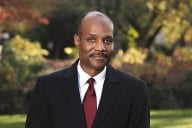You have /5 articles left.
Sign up for a free account or log in.
Many Christians value higher education in a way that non-Christians can not, says Rick Ostrander, in his latest book, Reconsidering College: Christian Higher Education for Working Adults (Abilene Christian University Press). It focuses on the nontraditional adult Christian college student -- at a time that many Christian colleges are experiencing booming enrollments with traditional-age students.
As a former nontraditional student himself, Ostrander says in his book that he knew the struggle well. He got married at 21, and decided to work while his wife went to college. After she earned her master's degree, Ostrander pursued his bachelor's in history. By the time he had enrolled in a master's in history program, he and his wife had three small children.
During the summers, he would operate a small painting business. Throughout the book, he attempts to stress the reason why working adult Christians should consider getting a college degree, despite the challenges they might face and why Christian colleges should reach out to students. Ostrander is the provost and chief academic officer at Cornerstone University, in Grand Rapids, Mich.
Ostrander responded to questions via email:
Q: The book focuses on how the nontraditional Christian college student should value higher education. How is a Christian’s way of valuing it different from a non-Christian’s?
A: Ideally, a Christian would value higher education not just for its practical benefits, but as a way to deepen his or her relationship with God. If I really believe that everything in the world is meaningfully connected to a personal God who created it, then that gives me additional incentive to learn. It enables me to more fully know the God that I believe in, and to experience God more deeply. In other words, studying chemistry helps me know more about the God who created chemistry.
Q: How do the traditional aged and nontraditional aged Christian college student differ?
A: Generally speaking, the non-traditional Christian student tends to be more established not just in their personal and professional lives, but also in their spiritual lives. While the typical traditional age student is wrestling with questions of faith and doubt and still trying to find his or her identity spiritually, the non-traditional student more likely has settled those sorts of questions. So when they come to higher education, the question that the adult student tends to ask is not “Do I really believe in Christianity,” but rather “How does my Christian faith apply to this subject I’m studying?”
Q: You write that education is a way for Christians to better understand God’s creation. How does that understanding and appreciation help them after graduation?
A: That’s the typical question we Americans ask! I think it depends on what aspect of God’s creation we’re talking about, and what career the graduate enters. Sometimes it will be in direct ways — for example, an understanding of psychology will help the person who seeks to progress in the field of business, which increasingly requires the ability to work well with others. But it may be in indirect ways, such as being able to see the interrelatedness of all subjects and transfer insights from one area to the next. For example, in my current job as a university provost, I constantly find myself transferring skills and insights I learned as a history major to my daily responsibilities.
Q: You talk about how some institutions have implicit worldviews that typically don’t inspire Christian students. In what ways?
A: I think it depends both on the institutions and the particular subjects being studied. Some institutions can be somewhat intolerant of faith perspectives that don’t fit with those of the dominant majority. Others, such as my alma mater, the University of Michigan, tend to be more consistent with their pluralistic principles and welcome a variety of perspectives on various subjects — at least that was my experience. In education, worldviews don’t necessarily clash, but may do so at times. For example, a Christian psychologist who believes that fundamentally, humans are spiritual beings made in God’s image may feel out of step in a psychology department that works from materialist assumptions about human nature.
Q: You suggest that, for some Christians, “seeking the Kingdom of God,” means they must pursue higher education. Why is that?
A: I think “for some Christians” is a good qualifier. Not everyone needs to go to college. But for many of us in the complex modern societies that we find ourselves in, being successful personally and contributing to shalom in the world will require that we develop the intellectual and spiritual qualities that higher education produces.
Q: Many Christian colleges have focused on traditional-age, residential undergraduates. How do they need to change to attract adult students?
A: They have to be flexible in the programs they offer and in the means by which they teach their subjects. Being willing to adapt class schedules to fit the lives of busy professionals is crucial; and obviously developing online learning approaches is very important to the adult student. At the same time, education is a communal endeavor, and adult students benefit from immersion in learning communities just as traditional students do. Those learning communities, however, have to adapt to the lives of adult learners. For example, at my institution and others, the “cohort” model, in which a group of 15-20 students takes the same set of courses together from matriculation until graduation, has proved to be very attractive for both its educational and relational benefits to adult students.








